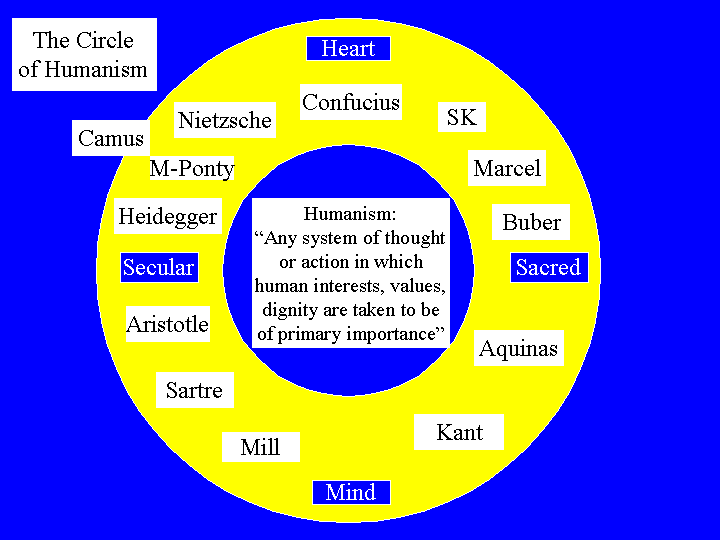
AN INTRODUCTION TO EXISTENTIALISM
Misconceptions:
1. Human nature formed by radical choice, not by socio-economic material conditions. Marxists see humans as "species-beings" not individuals.
2. Radical freedom vs. socio-economic determinism.
3. Anarchism (no government) or libertarianism (limited government) vs. authoritarian forms of government.
4. Existentialist dialectic vs. synthetic dialectic. Marx's "historical" or "dialectical" materialism.
5. Nonutopian vs. utopian.
But possible links between dialogical existentialism and neo-Marxism or Marxist humanism, especially in Merleau-Ponty. Later we will trace common themes from Hegel to Marx to existentialism.
Two short definitions of existentialism
F. Molina: "Existentialism is systematic, often technical, exploration of the category of the individual."
S. Kierkegaard:"The individual is the category through which ... this age, all history, the human race as a whole must pass."
Existentialism and Humanism
Sartre: "There is no such thing as a non-human situation."
Dictionary definition and Circle of Humanism.

Greek homo mensura ("humans are the measure") and Socrates' "Know Thyself."
Humanism and Titanism (Raskalnikov, Kirilov, Sartre). For more on Titanism click here.
Existentialist Themes (applies to both strict and dialogical existentialism):
1. Anti-essentialism. Sartre: "Existence precedes essence."
In his famous Oration on the Dignity of Man, Giovanni Pico della Mirandola (1463-1496) anticipates Sartre's motto. Pico has God (and presumably his divine assembly) saying this to Adam:
"We have given to thee, Adam, no fixed seat, no form of thy very own, no gift peculiarly thine, that,—as the thirsty drink—, thou mayest feel as thine own, have as thine own, possess as thine own the seat, the form, the gifts which thou thyself shalt desire. A limited nature in other creatures is confined within the laws written down by Us. In conformity with thy free judgment, in whose hands I have placed thee, thou art confined by no bounds; and thou wilt fix the limits of thy nature for thyself....Thou, like a judge appointed for being honorable, art the moulder and maker of thyself; thou mayest knead thyself into whatever shape thou dost prefer. Thou canst grow downward into the lower natures which are brutes. Thou canst again grow upward from thy mind's reason into the higher natures which are divine."
2. Anti-rationalism—-at least three senses (a) anti-logic--outright reject of reason; (b) or a reconstructed "broad" reason; (c) voluntarism—-will always precedes reason.
EXISTENTIALISM AND POSTMODERNISM
Existentalism's anti-essentialism and anti-rationalism suggests a connection to postmodernism, and there are indeed historical connections between the existentialists and the postmodern philosophers. But first, let us look at premodernism and modernism.
PREMODERNISM
Holism and organism: the whole is more important than its parts and the world is analogized as a living organism.
Time is cyclical. Premodern peoples stand in "terror of history," as Mircea Eliade has phrased it. Their rituals allow them to live in an Eternal Now.
Teleology and Animism: everything has a purpose; or, more fundamentally, everything has a spirit.
Although many premodern religious experiences are not mystical (they are primarily visionary), mystical union with the ultimate reality is a common cross-cultural premodern experience.
MODERNISM
Instead of organicism and holism, we have mechanism and atomism. Anticipations of this view already in the Greek atomists. The physical atom then becomes a model for the social atom of modernism, the autonomous self which breaks with the collective self of premodernism. The nation state, another great achievement of modernism, can also be seen as the social atom writ large on the internaltional scene.
Modern science rejects teleology and animism. Science and utilitarianism introduces the use of "calculative" reason and the modern bureaucratic state is the result.
Great modernist distinctions: fact vs. value; is vs. ought; science vs. morality/religion; public vs. private; politics vs. religion; theory vs. practice; mind vs. body (some views, such as Cartesian dualism).
Modern dualisms, such as Descartes', significantly different from premodern dualism such as Gnosticism and Manicheanism, in which matter is seen as evil.
TWO FORMS OF POSTMODERNISM
Common to both is a rejection of the modernist distinctions above. They also share a rejection of the idea of material and mental substances.
French Deconstruction (Jacques Derrida, et al.): no essences, no substances, and no God. No meaning to life, history, or the self. The autonomous self of modernism is completely "decentered." No objective interpretation of any even or text is possible.
Constructive Postmodernism. Organism, holism, and teleology of premodernism are revived, plus a postive view of the spiritual. A social-relational self instead of a complete rejection of the self. Meaning to life and history.